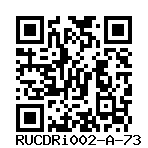IPSC-CraCCER, LiPSC-GR1.1-CraCCER, TC-1133-CraCCER
RUCDRi002-A-73
General
Cell Line |
|
| hPSCreg name | RUCDRi002-A-73 |
| Cite as: | RUCDRi002-A-73 |
| Alternative name(s) |
IPSC-CraCCER, LiPSC-GR1.1-CraCCER, TC-1133-CraCCER
|
| Cell line type | Human induced pluripotent stem cell (hiPSC) |
| Similar lines | No similar lines found. |
| Last update | 15th July 2024 |
| User feedback | |
Provider |
|
| Generator | University Medical Center Goettingen (UMG) |
| Owner | University Medical Center Goettingen (UMG) |
| Distributors | |
| Derivation country | Germany |
External Databases |
|
| BioSamples | SAMEA115833731 |
General Information |
|
| * Is the cell line readily obtainable for third parties? |
Yes Research use: allowed
Clinical use: not allowed
Commercial use: not allowed
Additional restrictions:
The cell lines can be obtained for non-commercial use by third parties using appropriate material transfer agreements (MTA) |
| Subclone of | |
Donor Information
General Donor Information |
|
| Sex | male |
Phenotype and Disease related information (Donor) |
|
| Diseases | No disease was diagnosed.
|
Other Genotyping (Donor) |
|
| Is there genome-wide genotyping or functional data available? |
No
|
External Databases (Donor) |
|
| BioSamples | SAMEA4938814 |
Ethics
Also have a look at the ethics information for the parental line
RUCDRi002-A
.
| For generation of the cell line, who was the supplier of any recombined DNA vectors or commercial kits used? |
hIPSC Derivation
General |
|
|
The source cell information can be found in the parental cell line
RUCDRi002-A.
|
|
Reprogramming method |
|
Vector free reprogramming |
|
Other |
|
| Derived under xeno-free conditions |
Unknown |
| Derived under GMP? |
Unknown |
| Available as clinical grade? |
Unknown |
Culture Conditions
Characterisation
No characterisation data could be found for this subclone. Please open parental cell line RUCDRi002-A .Genotyping
Karyotyping (Cell Line) |
|
Other Genotyping (Cell Line) |
Genetic Modification
| Genetic modifications not related to a disease |
|


Login to share your feedback, experiences or results with the research community.